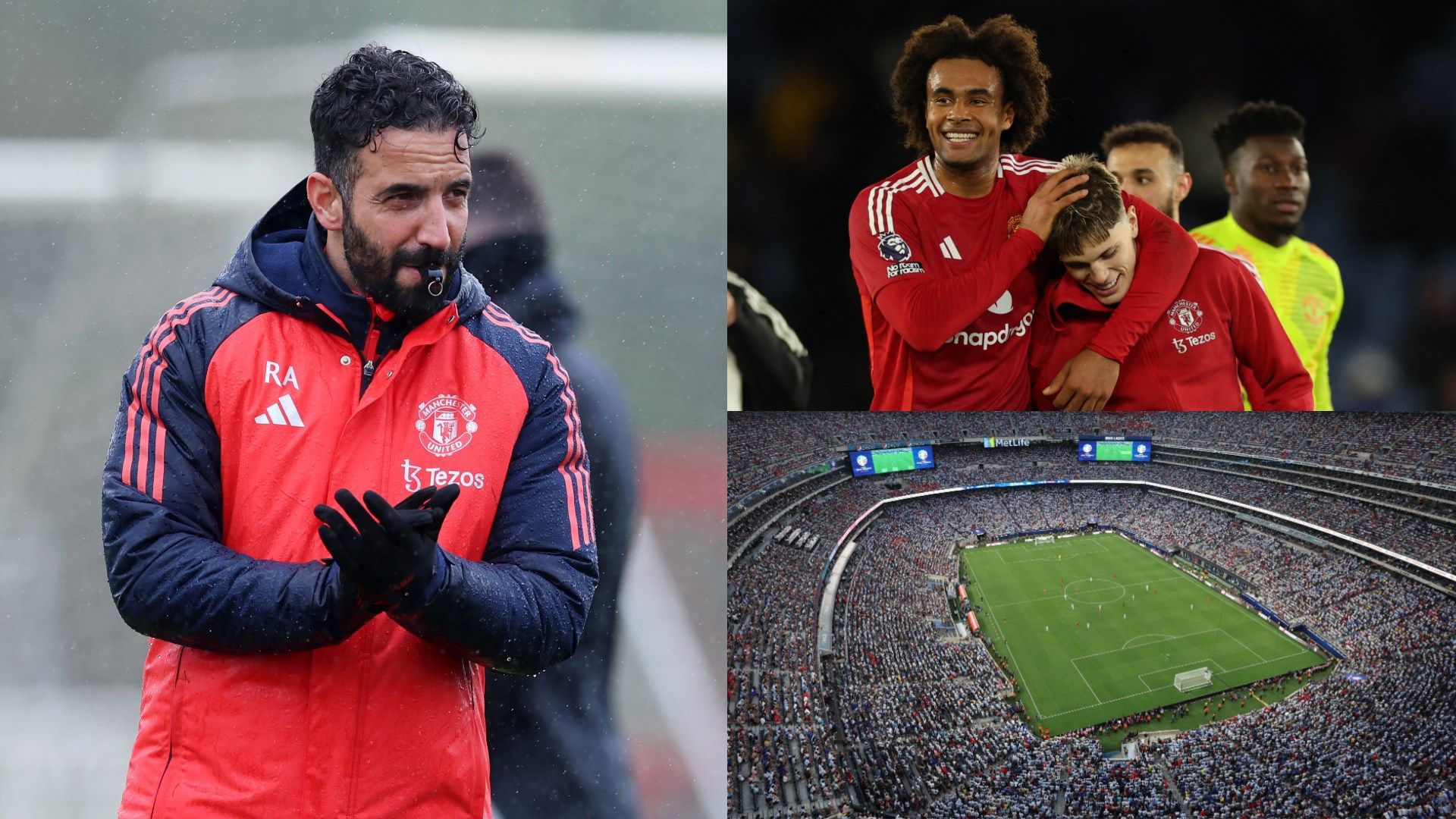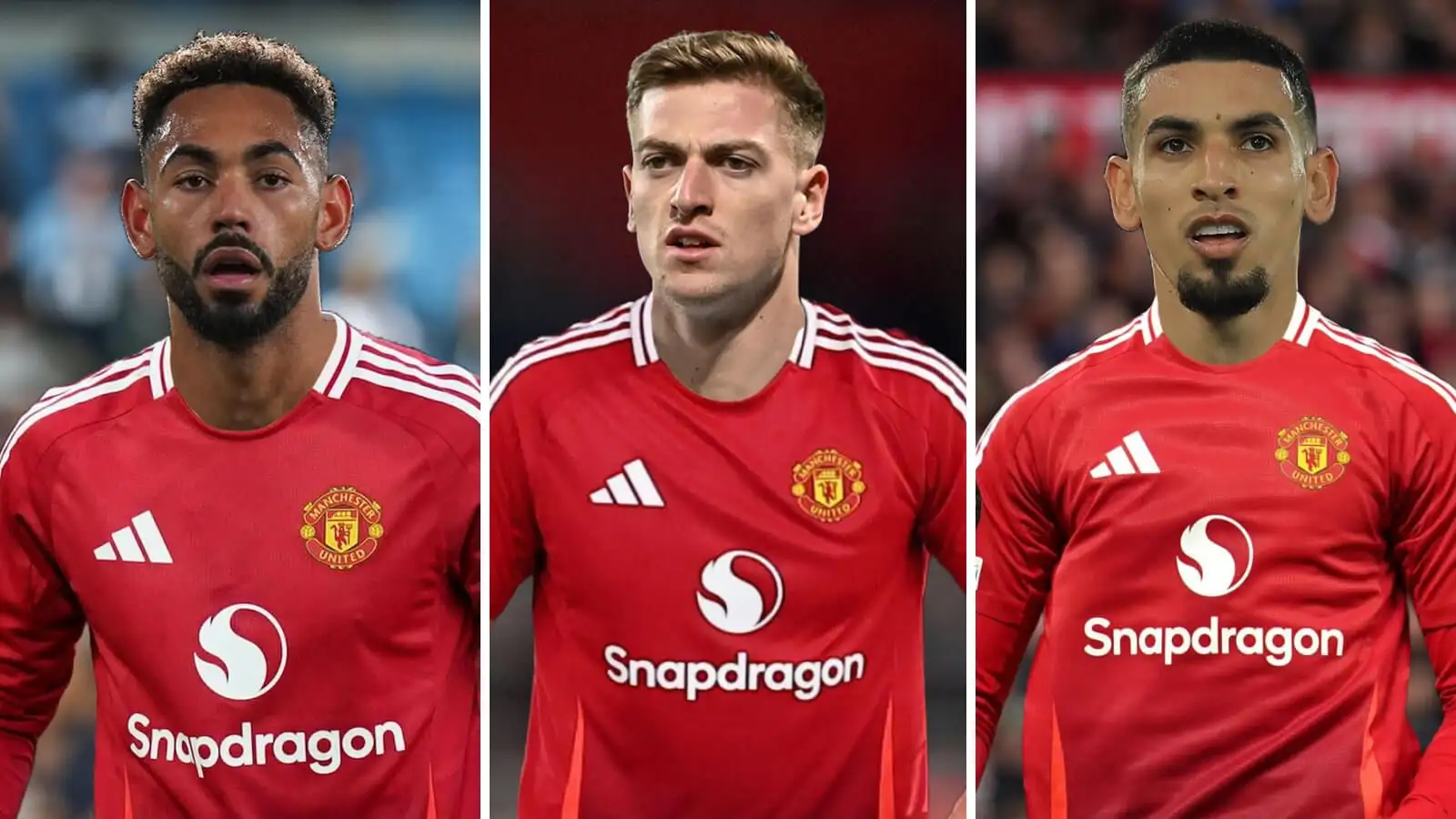The upcoming season for Man Utd 2025-2026 is poised to be a defining chapter in the club’s storied history. After a tumultuous period marked by underwhelming performances and financial setbacks, the Red Devils are entering a new era with significant investments and strategic overhauls designed to restore their former glory. As fans and critics alike scrutinize every move, the question remains: can Manchester United harness their new squad’s potential and turn the tide in their favor?
More Liverpool is facing challenges due to a lack of squad depth for the EPL 2025-2026
Introduction

Overview of the Season Ahead
The 2025-2026 season represents both a fresh start and a considerable challenge for Manchester United. Coming off a poor campaign where club management and supporters alike faced disappointment, the team now stands at a pivotal crossroads. The bold investments in new players signal a clear intention to rebuild a competitive squad capable of challenging domestic and European titles. However, the road ahead demands more than just transfusions of talent; it requires cohesive tactical implementation, effective team chemistry, and mental resilience to withstand the pressure of lofty expectations.
The strategic focus this season appears to be centered on blending experienced players with promising youth talent, fostering stability in critical positions, and imposing an attacking style of play that leverages the creativity of newly signed reinforcements. While the ambitious transfer window demonstrates commitment, embracing the complexities of integrating unfamiliar faces and shifting team dynamics will ultimately determine whether this season becomes a story of resurgence or regret.
Historical Context and Recent Performance
Historically, Manchester United has been synonymous with success, boasting numerous Premier League titles, European trophies, and legendary players. However, in recent seasons, the club has struggled to maintain consistency, grappling with managerial changes, inconsistent performances, and fierce competition across leagues. The last few seasons have seen questions raised about the club’s rebuilding strategy, financial health, and squad depth.
In the 2024-2025 campaign, their struggles were evident—mid-table finishes, early exits from continental competitions, and tension among the squad highlighted the urgent need for a comprehensive overhaul. This context underscores the significance of their bold transfer activities and strategic planning now, which aim to restore Manchester United’s competitive edge and forge a team capable of sustained success in the seasons to come.
Major Changes for the New Season

The Impact of Last Season’s Performance
The drubbing of last season’s results served as a wake-up call for the club hierarchy. Finishing 15th was an affront to their lofty ambitions, prompting radical changes to the squad and coaching staff. The club recognized that incremental improvements would not suffice; instead, a wholesale re-evaluation was needed to transform the team’s structure, mentality, and playing philosophy.
This performance crisis ignited a sense of urgency internally—leading to heavy investment in the transfer market, a focus on developing young talent, and a renewed emphasis on tactical flexibility. The alterations made during the off-season are not just about patching holes but about laying the foundation for a resilient, adaptable, and attacking team that can challenge for top honors again. These major changes reflect the club’s desire to write a new chapter characterized by consistency, dominance, and a compelling style of play.
Financial Investments in the Squad
A remarkable €229.7 million was spent constructing the new Manchester United squad—an extraordinary investment demonstrating their commitment to return to the top. Such a hefty transfer expenditure indicates a strategic intent to jump-start future successes, signaling to supporters and rivals alike that the club means business.
This financial venture prioritizes not just immediate impact but also long-term stability. Signings are carefully selected to fill gaps in key positions, bolster the attack, and strengthen the defense. While large outlays often carry risk, the club’s targeted approach aims to optimize the value of each acquisition, ensuring that Manchester United’s flag remains high among Europe’s elite.
Key Transfer Activities

Overview of Transfer Spending
The transfer window was marked by aggressive spending—a total of nearly €230 million—reflecting Manchester United’s desire to reshape their squad comprehensively. Investments ranged from high-profile signings to promising young talents, emphasizing a balanced approach that seeks immediate quality alongside future potential.
The scale of spending underscores the club’s awareness of their recent shortcomings and their resolve to correct them. With a competitive league landscape and Europe’s demanding standards, such an investment is both a statement of intent and a necessary step for rebuilding a squad capable of competing on multiple fronts.
Notable Incoming Players
Among the new signings, several names stand out for their potential impact. The arrival of striker Brian Embermo and winger Matos Cunya—valued at €75 million and €74.2 million respectively—are expected to redefine the team’s attacking potency. Their ability to create chances, score goals, and add flair to the frontline is crucial for Manchester United to reassert themselves as title contenders.
Furthermore, the signing of Benjamin Sasco for €76.5 million signals a strategic move to reinforce the attacking options. With a reputation for scoring goals and providing creativity, Sasco’s role in forging a lethal strike partnership could be decisive. These players are not just acquisitions; they represent the club’s ambition to inject new life into an offense that struggled in previous campaigns.
The Significance of Brian Embermo and Matos Cunya
The two forwards—Embermo and Cunya—are pivotal signings that could potentially change Manchester United’s offensive dynamics. Embermo’s physicality and clinical finishing offer a robust target man option, while Cunya’s pace and dribbling skills provide width and unpredictability. Their addition is expected to diversify coach tactics and make the attack less predictable.
Their integration into the team, however, will be crucial. The challenge lies in ensuring they fit seamlessly into the tactical framework and synergy with existing players. Successfully harnessing their talents can unlock a new level of attacking efficiency, vital for both domestic success and European ambitions.
Exploring the Addition of Benjamin Sasco
Benjamin Sasco is seen as a vital cornerstone of United’s new attacking structure. Valued at €76.5 million, his versatility allows him to operate across the front line, giving tacticians multiple options. His eye for goal, combined with his ability to link play, makes him a central figure in any offensive setup.
The success of Sasco’s integration depends on the team’s ability to provide him with service and space. His presence on the pitch theoretically elevates Manchester United’s scoring potential, but it will require effective new combinations and creative midfield support to maximize his effectiveness.
Current Squad Analysis
Goalkeeping Situation
The goalkeeper position remains a delicate area. Andreana, the primary choice, has demonstrated flashes of quality but struggles with consistency. The backup goalkeepers lack significant opportunities to establish themselves, which could pose risks in tough fixtures or during injury crises.
The club might consider additional competition or tactical adjustments to ensure stability. Goalkeeping often influences defensive confidence, and any instability here could ripple through the entire backline, emphasizing the need for focus and perhaps future signings to reinforce this critical position.
Defensive Line and Its Challenges
Manchester United’s defense continues to grapple with a lack of experienced central defenders. Young players have shown promise but lack the composure and consistency that senior players bring. The defense’s stability hinges on better coordination and perhaps tactical reforms to compensate for this inexperience.
Strengthening the backline remains a priority, with the club possibly eyeing additional signings or adjusting formations to provide better cover. Developing the emerging defenders’ composure under pressure will also be crucial for improved defensive resilience throughout the season.
Midfield Dynamics
A significant concern lies in the midfield, where the absence of a stable and commanding central pairing hampers overall team fluidity and control. Without a consistent deep-lying midfielder or a reliable duo, Manchester United’s ability to dictate play and transition effectively remains compromised.
Tactical flexibility and strategic choices will influence how the team navigates this issue. The midfield needs to evolve into a cohesive unit that reacts dynamically to various game situations, emphasizing ball retention, press resistance, and quick transitions to exploit attacking opportunities.
Attack: Talent Versus Redundancy
The attacking line boasts new signings and promising talents, yet the potential for overlapping roles and players operating in similar spaces creates concerns about redundancy. If multiple forwards attempt to occupy identical channels, offensive fluidity could suffer.
To mitigate this, bespoke tactical instructions and positional discipline will be necessary. The goal is to craft an attack where creativity and movement complement each other, ensuring that the collective effort exceeds individual brilliance.
Tactical Overview
Predicted Formations and Styles of Play
While the club has yet to reveal an explicit tactical system, early indications suggest a preference for an attacking, possession-based approach that leverages the versatility of new signings. A 4-2-3-1 or 4-3-3 formation could best suit the dynamic attacking options, providing width and support in midfield.
Implementing fluid positional interchange and high pressing could revive Manchester United’s characteristic aggressive style, aimed at dominating possession and creating scoring chances from controlled build-up play. Emphasizing pressing triggers and quick transitions will be integral to this strategic shift.
Potential Strategies for Maximizing New Signings
Maximizing the impact of Embermo, Cunya, and Sasco requires tactical systems that exploit their individual strengths. For Embermo, incorporating target-man roles or hold-up play can open space for runners. Cunya’s pace can be utilized in counter-attacks and wide overlaps, while Sasco’s creativity can be unleashed through penetrating passes and positioning in the penalty area.
Synergizing these approaches involves detailed planning and training to develop chemistry. Coaches will need to design drills that foster understanding between the players, enabling them to anticipate each other’s movements and capitalize on scoring opportunities efficiently.
The Young Stars
Highlighting Emerging Talents from the Academy
Manchester United’s commitment to youth development remains a cornerstone of their philosophy. Several promising talents are steadily rising through the ranks, offering fresh energy and potential solutions for future challenges. These emerging players are vital not just for squad depth but for maintaining the club’s identity as a pioneer of developing homegrown talent.
Their progression will be closely monitored to gauge their readiness for top-flight competition. Integrating young players into the first team gradually can help build a resilient, motivated squad capable of adapting to different tactical demands and overcoming in-game setbacks.
Balancing Youth and Experience in the Squad
Finding the right mix between youthful exuberance and seasoned experience remains a strategic priority. While young players bring energy, hunger, and vanguard tactics, their inexperience can be a liability in high-pressure situations. Conversely, seasoned veterans provide stability, leadership, and tactical wisdom.
Manchester United’s success will depend on how effectively the coaching staff can blend these elements—empowering young talents while harnessing the guidance of experienced squad members. This balance aims to foster a cohesive unit capable of both attacking flair and defensive solidity.
Building Team Cohesion
Importance of Teamwork and Chemistry
Cohesion on the pitch is often the unseen force behind consistent success. Manchester United recognizes that talent alone is insufficient; unified team chemistry, clear communication, and mutual understanding are essential to execute tactical plans smoothly.
Developing this team spirit calls for dedicated training, social cohesion activities, and leadership that encourages collective responsibility. Building trust among players, especially new signings, will be key to transforming individual talent into a formidable, synchronized team.
Strategies for Fostering Unity
Effective strategies include structured team-building exercises, clarity in tactical roles, and fostering a culture of accountability. Regular video analysis sessions and collective feedback can also enhance understanding on the field. Supporters’ involvement, through matchday atmosphere and community engagement, adds to the motivational climate.
Integrating players from different backgrounds and experiences into a shared team vision will ultimately lay the foundation for resilience during challenging periods and seamless execution during crucial fixtures. A united squad is more likely to overcome adversity and realize their collective potential.
Pressure and Expectations
Managerial Expectations and Objectives
Amid high stakes, the managerial staff faces enormous pressure to deliver immediate results while laying the groundwork for sustained success. Their objectives include not only winning matches but also developing tactical flexibility and fostering a winning mentality within the squad.
Success will be measured in various metrics—league standings, cup runs, European performance, and player development. The manager’s ability to adapt, motivate, and extract maximum from the squad will be scrutinized by supporters, owners, and pundits alike.
Player Performance Under Scrutiny
Each player’s contribution will be under intense examination, especially the high-profile signings brought in during the transfer window. Consistency in performance, adaptability to tactical demands, and resilience under pressure will differentiate stars from mere potential.
In a season fraught with high expectations, individual accountability becomes crucial. Players who excel will reinforce confidence, while those who falter might face difficult questions about their future at the club.
The Role of Leadership
Captaincy and Leadership Dynamics
Leadership within the squad plays a vital role in navigating the season’s ups and downs. The captain’s influence extends beyond the pitch, shaping team morale and tactical discipline. Ensuring the right person is in this role, who exemplifies resilience, charisma, and tactical awareness, is critical.
Effective captains inspire confidence, mediate conflicts, and foster a culture of professionalism. Their rapport with both coaching staff and teammates can be decisive in translating tactical plans into real-game success.
Role of Experienced Players in Guiding New Talent
Veterans serve as mentors, especially for the influx of new players adapting to Manchester United’s expectations. Their experience in high-pressure scenarios, professionalism, and leadership qualities are indispensable assets.
Encouraging experienced players to actively guide and support emerging talents can accelerate team cohesion and consistency. This mentorship fosters a positive environment and helps mitigate setbacks or lapses in form during demanding periods.
Fan Expectations
The Supporters’ View on Changes
Manchester United fans have long demanded a return to their winning ways, and the current squad overhaul has reignited hope and enthusiasm. They recognize the risks associated with new signings but view them as necessary investments to bring back league dominance.
Supporters’ expectations include not only titles but also attractive, attacking football that embodies the club’s heritage. Their emotional investment fuels the players’ motivation, creating a passionate atmosphere that can lift the team during difficult moments.
The Emotional Investment of Fans
The connection fans feel towards Manchester United transcends results; it’s woven into their identity and collective memory. As the team embarks on this new chapter, fans will judge progress by resilience, growth, and the eventual return to glory.
Their unwavering support, whether in victory or defeat, reinforces the club’s resilience and ethic. The season ahead will test that emotional commitment, but it remains a vital driver for success.
Rivalry and Competition
Assessing the Competitive Landscape in the League
The Premier League remains fiercely competitive, with clubs like Manchester City, Liverpool, Chelsea, and Arsenal vying for supremacy. Each has invested heavily and improved their squads, making the championship race more unpredictable than ever.
Manchester United’s challenge is not only to rebound but also to consistently outperform rivals over a grueling campaign. Strategic consistency, squad depth, and tactical adaptability will be vital tools in gaining an edge in this crowded arena.
Key Rivals and Fixtures to Watch
Matchups against traditional rivals will be critical for gauging progress. Fixtures against Manchester City and Liverpool hold particular significance, serving as benchmarks for assessing whether the new squad can handle top-tier competition.
Early-season encounters can set the tone, influencing momentum and confidence. As the season unfolds, these rivalries will shape narrative arcs and test Manchester United’s resilience and tactical acumen.
Notes
Reflection on Past Strategies
Historically, Manchester United has approached transfers and tactical planning with a mix of ambition and caution. Past strategies often involved big-name signings without sufficient emphasis on squad cohesion or playing style adaptation. These lessons highlight the importance of strategic patience and holistic squad building this time.
Adapting from past missteps involves integrating new players thoughtfully, emphasizing team chemistry, and maintaining tactical clarity. Patience and planning are crucial for translating investment into tangible success.
Importance of Player Adaptability
In today’s football landscape, flexibility and adaptability are key attributes. Manchester United’s new signings and existing squad members must quickly learn new systems, roles, and team dynamics.
Prioritizing player versatility and mental resilience will be central to overcoming unforeseen challenges during the season. Those able to adapt swiftly will be pivotal in helping the team navigate variability and secure positive results.
Mistakes to Avoid
Overreliance on New Signings
While fresh signings generate excitement, undue dependence on them can create instability if they fail to adapt or underperform. The core philosophy should involve balanced team development, where existing players are empowered alongside newcomers.
Overreliance could also prevent the development of team cohesion, which is essential for sustained success. Managing expectations and integrating players gradually can mitigate this risk.
Neglecting Defensive Stability
Attacking prowess alone does not guarantee success. Manchester United must strengthen their defensive organization, avoid complacency, and instill discipline at all levels. Neglecting defensive stability risks costly mistakes that could undermine an otherwise promising campaign.
A focus on tactical discipline, disciplined pressing, and defensive communication are vital to maintain results. Building a solid defensive foundation is indispensable for climbing the league standings.
Failing to Integrate Youth Players Effectively
While youth talent offers long-term benefits, poor integration can lead to unrest or underperformance. Young players need guidance, opportunities, and proper mentoring to develop confidence and consistency.
A thoughtful approach to inclusion ensures that youth prospects contribute meaningfully without disrupting squad harmony. Balancing experience and youth ideally creates a resilient and adaptable team.
Frequently Asked Questions
What are the main goals for Man Utd in this season?
The primary objectives include regaining domestic dominance, making a substantial impact in European competitions, developing a cohesive team that plays attractive football, and nurturing young talent for future sustainability. The overarching aim is to restore Manchester United as a football powerhouse through winning titles and rebuilding the club’s identity.
How will the new signings impact the team’s performance?
The incoming players are expected to elevate the team’s attacking potency, add creative options, and address previous deficiencies. Their individual quality can transform Manchester United’s offensive output and provide tactical flexibility. However, their impact hinges on successful integration and collective team synergy, which can take time but promises long-term benefits.
What challenges might the team face early in the season?
Adjusting to new tactical systems, building chemistry among freshly assembled units, managing injuries, and coping with intense rivalry pressure are notable early hurdles. The team must quickly adapt despite these challenges to establish momentum, foster confidence, and avoid costly slip-ups that could hamper their title ambitions.
Conclusion
The Man Utd 2025-2026 season heralds a renewed hope driven by strategic investments, promising talent, and a desire to reclaim their rightful place among Europe’s elite. While significant challenges remain—such as integrating a new squad, solidifying defensive stability, and fostering team chemistry—the club’s clear focus on attacking football and players’ development offers a compelling blueprint for success. Ultimately, the season’s outcome will depend on how effectively the team can translate talent into cohesive performance, withstand the pressure of high expectations, and adapt to the dynamic landscape of competitive football. With determination, tactical finesse, and support from their passionate fans, Manchester United could very well script a remarkable comeback and etch a new chapter of glory in their illustrious history.

